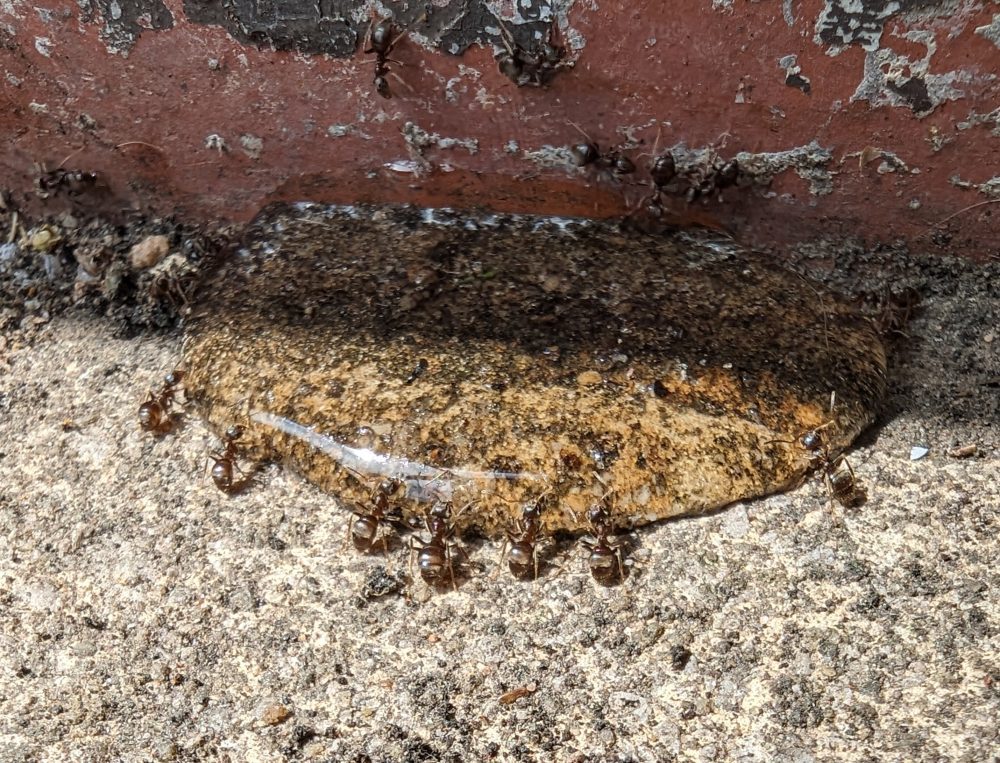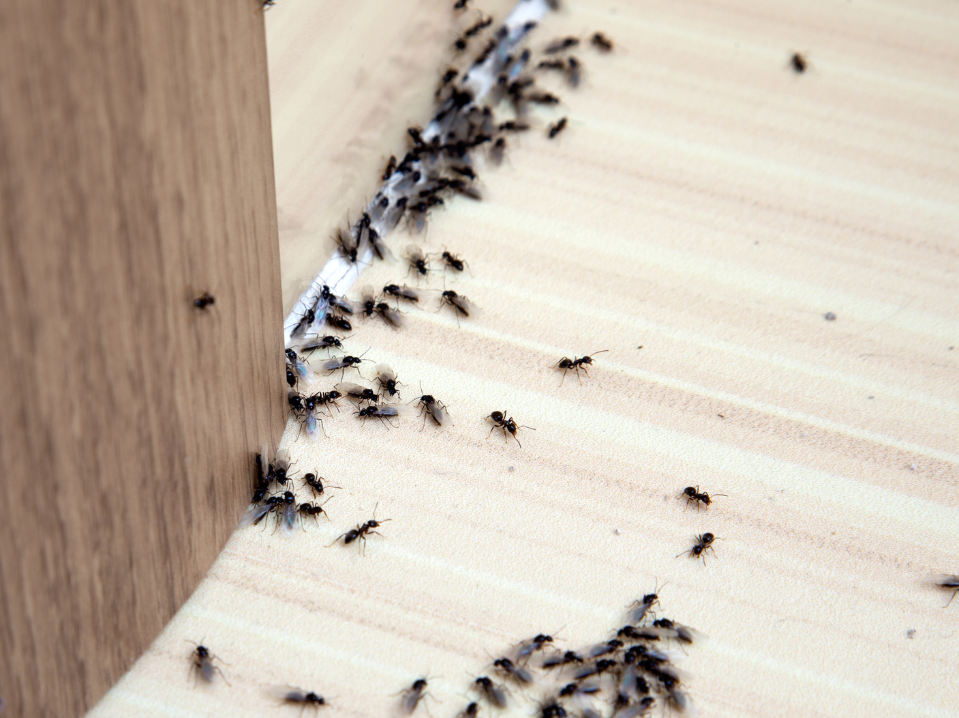Ant Removal Lancashire
Professional Ant Control Services
If you’ve got ants in your kitchen, around your windows, or trailing along skirting boards, you’re not alone. Black garden ants are the usual suspects in the UK, especially in Spring and Summer but they’re not the only ones. Different species, like Pharaoh ants, need different treatment methods.
That’s why we don’t just spray and hope. We identify the species, find the entry points, and target the colony, not just the ants you see. Our ant control service is fast, precise, and designed to stop infestations at the source.

Contact Wallace Pest Control
If you have an ant infestation that you need urgent help with, please contact us using the form below or call us on 07496 680879, and our experienced, friendly team will offer advice and provide an effective solution.
Don't let ants take over your space of comfort. Instead, contact a professional pest control service today to eliminate the problem.
Visit 1: Inspection & Initial Treatment
- Species identification: We confirm which type of ant you’re dealing with and assess how widespread the activity is.
- Gel bait application: We use a professional-grade bait that attracts foraging ants, who then carry it back to the nest. Over the next few days, this is shared among the colony, including the queen, leading to full colony elimination.
- Post-treatment guidance: You’ll be asked not to clean treated areas for 24 hours, so the bait remains accessible and effective.


Visit 2: Follow-Up (If Needed)
If ants are still active after 14 days, we’ll return to reassess and strengthen the treatment:
- Alternative gel bait: We use a different formulation to ensure effectiveness, even if the colony has developed some resistance.
- Insecticidal dust: If required, we will apply insecticidal dust into cracks, wall voids, and other hidden spaces where ants may be nesting or trailing. It works as a supplementary aid to target areas that the bait can’t reach.
We know everyone’s heard the at-home remedy of pouring boiling water on the nest, but unfortunately, this doesn’t work.
All it does is annoy a few workers on the surface while the queen and the rest of the colony stay tucked away, ready to resurface a week later. Which is why it is important to seek professional treatment.
These treatments work slowly and strategically, using the ants’ own behaviour to spread the active ingredients through the colony, ensuring long-term results.
Signs You May Need Ant Control
Ants can be more than just a nuisance. If you’re noticing any of the following, it’s time to act:
- Regular sightings of trailing ants, especially in kitchens or bathrooms
- Ants emerging from cracks in brickwork, around windows, or under skirting boards
- Presence of a nest outside, often in paving cracks or flowerbeds
- Pharaoh ants (very small, light yellowish) are spreading indoors, these require a different strategy than black garden ants.


Customer Preparation Before the Visit
To help us carry out your ant treatment safely and effectively, please:
- Tidy food areas: Wipe down kitchen surfaces, store food in sealed containers, and clean up any crumbs or spills.
- Clear access: Move lightweight furniture or objects blocking ant trails, especially around skirting boards.
- Vacuum and declutter: Pay attention to the edges of flooring and around objects where ants may trail.
- Keep pets and children away from treatment areas: During and shortly after the visit, please make sure pets and children aren’t in the spaces we’ll be working in. We’ll let you know exactly where treatments are placed and when it’s safe to re-enter those areas.
- Let us know where you’ve seen activity: Tell your technician about any entry points, trails, or known nests.
Post-Treatment Advice
To get the best results from your ant treatment, here’s what we recommend:
- Avoid cleaning treated areas for 24 hours: This allows ants to continue following their trails and interacting with the bait. Cleaning too soon can remove or disrupt the treatment.
- Expect a spike in activity: You may see more ants before you see fewer. This is normal and actually a good sign; it means the bait is being taken back to the colony.
- Ventilate rooms: If the technician applied insecticidal dust or a residual spray as a supplementary treatment, open windows and doors for at least 20 minutes afterwards to allow fresh air to circulate before re-entering.
- Avoid disturbing treated areas: This includes not wiping surfaces where bait or dust has been applied and not moving bait placements.
- Monitor activity: Keep an eye on any changes and let us know if activity continues beyond 14 days. We’ll schedule a follow-up if needed (at no extra cost).
Ongoing Prevention Tips
Once the ants are gone, keeping them out comes down to a mix of common sense and sealing up the right weak spots. Here’s what we recommend:
Seal Entry Points Properly
Ants don’t need much of an opening to get inside. Use decorators' caulk for interior gaps (around skirting boards, pipework, and under units), and weatherproof silicone sealant for outdoor cracks around doors, windows, or brickwork.
Pay particular attention to areas where you've seen ants trailing.
Fix Moisture Issues
Living in Lancashire means damp is often a fact of life, especially if you're near the Pennines! But ants, like many insects, are drawn to moisture just as much as food. Fix leaking pipes, check under sinks, and avoid leaving standing water in trays or plant pots.
Store Food Properly
Ants are expert foragers. Once a single scout ant finds a crumb or a spill, it lays down a pheromone trail, and within hours, you’ve got a full foraging party.
Keep all food (especially sugary or greasy items) in airtight containers, wipe up spills promptly, and avoid leaving food out overnight.
Stay Vigilant
Check regularly for signs of activity, particularly during warmer months. Look for:
- Thin trails along walls, pipework, or baseboards
- Soil or grit pushed up near entry points
- Activity around bins or kitchen plinths
The earlier you catch them, the easier they are to deal with before a full colony sets up shop.
FAQs: Ant Control
Ready to Sort Out Your Ant Problem?
Whether it’s the odd trail in the kitchen or ants turning up in numbers, our professional treatment targets the whole colony, not just the ones you can see.
- From just £120, including follow-up if needed.
- Serving homes and businesses across Lancashire.
If ants are bothering you, contact us immediately or call us at 07496 680879. Our knowledgeable, helpful team will offer suggestions and propose a workable solution.
Related Blogs
If you’ve got ants in your kitchen, around your windows, or trailing along skirting boards, you’re not alone. Black garden ants are the usual suspects in the UK, especially in Spring and Summer but they’re not the only ones. Different species, like Pharaoh ants, need different treatment methods.




